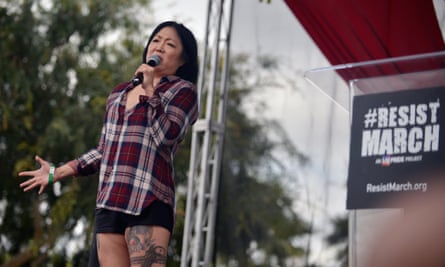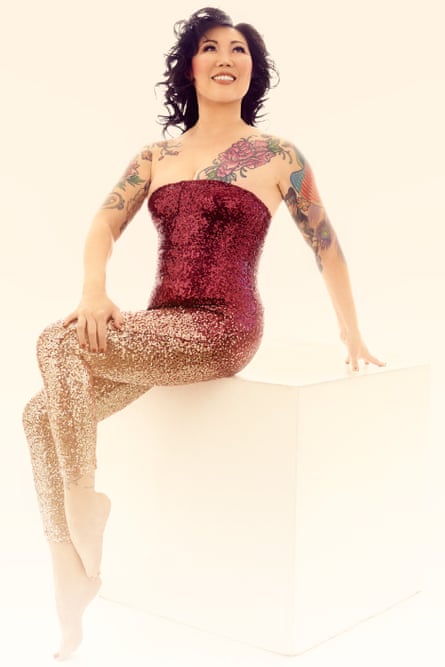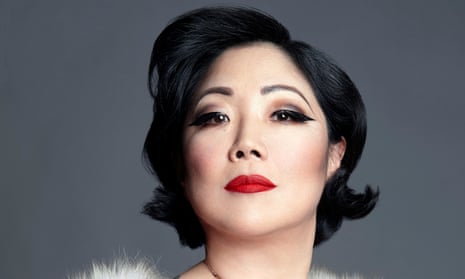The thing about being a standup comedian is that you can never turn off that part of your brain, not even when you are trying to kill yourself. Margaret Cho learned this in 2013 when she attempted suicide in a hotel room, using a shower curtain rail. “It started bending and I was like: Oh shit, I’m too fat to kill myself, so I had to get down,” says Cho. “I thought: I’ll go on a diet and I’ll try again when I reach my goal weight, which means I’m never going to kill myself, because I’ll never reach my goal weight.”
The 52-year-old Emmy-, Grammy- and Oscar-nominated comedian, author, actor and podcaster lets out a delighted cackle. “That joke … people get really upset. They’re like: ‘You should put in a trigger warning.’ I don’t know how to do a trigger warning!” The point Cho is trying to make is a serious one. “My sense of humour probably saved me from dying,” she says. “You can’t really shut that part of you off, because humour is really hope. Humour and laughter is the intake of breath, which is the preservation of the body for the next moment … at your darkest moments; it’s actually the thing that shines the brightest. I’m really grateful for it and I’m really grateful I got to live.”
Comedy has saved Cho’s life several times over. In her 2002 memoir I’m the One That I Want, Cho describes the alcoholism, drug addiction and depression that followed the cancellation in 1995 of her sitcom All-American Girl. “Suicide … seemed very practical to me … [I decided] to drink as much as I could until I just stopped breathing,” she writes. A survivor of rape and childhood sexual abuse who has spoken often of the racism her parents – Korean immigrants to San Francisco in the 60s – experienced, Cho has forged a style of humour that is intimate, confessional and utterly without self-pity. As Jameela Jamil said with horrified relish while interviewing Cho for a recent podcast: “I can’t believe how fucking intersectional your trauma is.”
We are speaking via a video call. Cho is on the couch in her home in Los Angeles, her part chihuahua, part dalmatian rescue dog, Lucia Caterina, on her lap. Her two sphynx cats are asleep in another room. “I just caught her peeing on the cats’ play rug,” Cho says of Lucia Caterina. “Just a little bit, just to mark her territory.” She is in a relaxed and contemplative mood.
The past 12 months have been horrendous for the Asian community in the US and beyond. Cho is a leading voice in the Stop Asian Hate movement, giving interviews and using her podcast to focus on anti-Asian hate crimes. Since the Covid pandemic, which originated in Wuhan, China, hit the US, attacks on Asian-Americans have been rising. Analysis from California State University has found that anti-Asian hate crime in major US cities increased by 149% in 2020 (in the UK, the Home Affairs select committee heard last May that hate crime directed at east and south Asian communities had increased by 21% during the pandemic). Much of the animus, early on, was driven by Donald Trump’s descriptions of the coronavirus pandemic as the “Chinese virus” or “kung flu”.

But Cho points out that anti-Asian sentiment goes much deeper. “I love to Donald-Trump-bash and blame him for any reason I can, but the fact is that his casual racism is more a symptom of the greater problem than the cause of this,” says Cho. The upcoming season of her podcast The Margaret Cho: Mortal Minority will examine crimes such as the 1871 Chinatown massacre in LA. “It’s about the repetitive nature of hate crimes and how they’re not new, even if they seem new, because they’re presented as shocking and new by the news.”
On 16 March, attacks on the Asian-American community peaked with the killing of eight people at three Asian spas in Atlanta, Georgia. Six of the dead were Asian-American women. Cho was in bed with Lucia Caterina when she saw the news. She felt the horror of it viscerally: Cho lived in Atlanta for seven years and often visits Asian spas. “They’re all women about my age,” Cho says of the victims, four of whom were, like her, Korean-American.
Almost as upsetting were comments from the Cherokee County sheriff’s spokesperson, Jay Baker, denying that the crimes were racially motivated and suggesting that the shooter was a sex addict who was having a “bad day”. It later emerged that Baker had reportedly shared an anti-Asian image on social media. “It was very upsetting to see the police try to humanise and emotionally connect with the shooter,” says Cho. “Why were they making such an effort to justify his actions? This was obviously a hate crime.”
The day before we speak, there is another mass shooting, this time in Virginia. “We had a bit of a reprieve from the nightmare of gun violence because of the pandemic and now things are starting to heat up again,” says Cho. “We have really lost the right to bear arms.”
Because many of the anti-Asian hate crimes have targeted older women, Cho has seldom left the house in recent months, frightened of the threat from Covid and for her physical safety. “I’m really scared,” she says. “It’s kind of like: how do you escape your skin? I limit my time out and I think it’s awful to acknowledge that.” When she does venture out, Cho dons an elaborate construction that she bought on Kickstarter. “It’s like a Pierre Cardin 60s space helmet that blocks UV light and has sunglasses built into it.” She wears it when walking Lucia Caterina in the streets around her home. “It’s the total older Asian lady look, with the hat and the sunglasses and the gloves,” she laughs. “I’m so sun-protected and I also look like I could play golf at any second.”
Cho lives alone in a high-ceilinged house that is besieged by bees. “I just went outside and it sounds like there’s a vibrator going off by the windows, because there’s so many bees,” she says. Swarms aside, Cho relishes her solitude. “I’m not going to live with anybody else ever,” she says. (She filed for divorce from her ex-husband in 2015.) “You know, as women, we’re told: ‘Oh, you’re going to die alone’; that’s like the biggest fear. But I’m actually really hopeful that I die alone. It’s great to sleep in the middle of the bed, to watch whatever you want, to eat whatever you want, and not to have to police your actions because of somebody else in your space.”
She is dating someone new, although Cho, who is bisexual, will not be drawn on their gender. In classic Cho style, a recent date ended in scatological disaster. “I shit the bed about a month ago,” she says, casually. She traces it back to some flirtatious meal prep, emulating the venerable US TV chef Ina Garten. “I was making chicken and I was eating things off the cutting board, but I ate a piece of raw chicken and I didn’t spit it out. I knew I should have, but I didn’t want to be seen spitting. The next day, I not only shit the bed, but I shit a weighted blanket.”

As Cho is telling me this, I am waiting for her publicist, who is on the call, to unmute and change topic, but he doesn’t. Then again, he does represent a comedian whose most recent live tour, 2015’s PsyCHO, involved a lengthy dramatic imagining of an ice-bucket-style charity challenge for gay men performing cunnilingus. I wonder what Cho would have to say for him to intervene.
“Anyway, I let the shit just dry and then I just kind of flicked it off,” Cho continues airily. “But I had shit the bed so far down that I shit into my dust mite cover, which is waterproof … I mean, really – don’t eat raw chicken was the lesson, and I threw the blanket away.”
Gastrointestinal adventures in food poisoning aside, Cho is doing well. She is sober, after more than a decade addicted to opiates and alcohol. “I’ve had a long love affair with opiates,” says Cho, who at one point considered sourcing some opium poppies. “I was going to get really Martha Stewart and go to the flower market, but I was just too wasted.” Cho loved the aesthetics of opium smoking. “It’s a terrible drug, it is a really big part of the difficulties that Koreans and Chinese people have had, it’s a big black mark on our history,” Cho says, pausing for effect, a comedian to her bones. “But the stuff is really cool! Like, all the pipes and the bags and everything.”
In the depths of addiction in 2016, she had a disastrous performance at the Stress Factory in New Jersey, with some audience members staging a walkout. At the time, Cho blamed it on jetlag. “I was high and hungover at the same time,” she says now, “and I was really upset because [the renowned standup] Garry Shandling had just died and I was with somebody I didn’t want to be with.”
Later that year, Cho’s friends staged an intervention, forcing her to go to rehab. “I was tricked,” says Cho. “They took me to a birthday party and it wasn’t a birthday party. It was my intervention.” On the drive to the facility, Cho was pinioned between two friends on the backseat, lest she make a break for it. Cho spent a year and a half in rehab; 12 people she was in treatment with subsequently died. “The entire situation made me very grateful to be alive. It’s pretty incredible that I got out of opiates before I got into fentanyl,” she says, referring to the synthetic opiate linked to the deaths of more than 36,000 people in the US in 2019.
In rehab, Cho realised that she had been abusing drugs as a way of blocking out trauma. “The thing about opiates is that it’s not really a high, it’s a removal of you caring, but you still feel the pain, you still feel the anguish. Only the choice of whether or not to care about it is removed chemically.” Cho realised this pain was largely down to external factors, “like how society looks at women, or at Asian-Americans, and how these problems are internalised, and erupt in my self-harm”.
As a child, Cho aspired to whiteness, studying the pages of Seventeen magazine and wishing she looked like the svelte teen starlet Lori Laughlin. “I wanted to be her so badly,” laughs Cho of Laughlin, who was recently imprisoned for bribing a college admissions consultant. “And you know, what did she do with it? She didn’t do anything very good with it! She went to prison.” In her 20s, before the filming of All-American Girl, Cho was told by executives to lose weight. Cho dropped 30lb (13.6kg) in two weeks and went into kidney failure on set. She later became addicted to slimming pills. “I have a lot of regret,” says Cho of that period, “because I did not appreciate how beautiful I was. I just thought I was fat and ugly and I was so angry about the way I looked.”
She speaks passionately about so-called “aspirational whiteness”, meaning the desire of many immigrants to escape racism by assimilating into white communities and presenting themselves as “model minorities” who would produce the next generation of doctors, accountants and lawyers. “There’s a huge part of the Korean community that’s very aspirationally white,” says Cho. “Like, you have to go to an Ivy League school and drive a Mercedes.” Cho, a foul-talking, pot-smoking college dropout who worked as a phone sex operator in her teens, could not have been further from the stereotype. “The model minority thing really made me want to rebel against it,” she says. “I went into the artist life and I was kind of a bum. I mean, I still am a bum. My parents think I’m a bum because I’m not married.”
All-American Girl bombed because Cho was unable to unshackle herself from those mental bonds. White male screenwriters changed Cho’s character from a potty-mouthed delinquent into an obedient, dutiful daughter. The sitcom was loathed by the Asian community it was supposed to represent and bored the white audience to which it was supposed to cater. Cho did not take the criticism from the Korean community in good temper, something she is contrite about, decades on. “I understand their reaction now and I feel really sad that I didn’t handle that particularly well,” Cho says.
In recent years, Cho has become an elder stateswoman for Asian-Americans in the entertainment industry. When, in 2014, Eddie Huang’s memoir Fresh Off the Boat was turned into the first network sitcom with an all-Asian American cast since All-American Girl, Cho consulted on the show. “I’m fortunate that I’ve been able to survive long enough in the entertainment industry that there are a generation of Asian-American performers who look up to me … that’s probably my greatest achievement.”

In lieu of an Asian-American role model, Cho’s idol growing up was the merciless Joan Rivers. Like Rivers, Cho’s style of comedy is extreme. Nothing is off limits, which can cause her to fall foul of socially progressive audiences. In 2015, Cho was criticised for impersonating a North Korean general at the Golden Globes. “It’s just dumb,” Cho says of the incident. “Most of the people who were angry about it were white!”
When asked about whether so-called “cancel culture” is harming comedy, Cho equivocates. “For me, where cancel culture does great work is where you realise someone’s true intentions and you’re like: urgh,” she says. “Piers Morgan is a great example of like: oh God, that’s what you think? You know, why have we been watching him?” For years, Cho, who identifies as queer, referred to herself as a “fag-hag” in her shows, shouting a slur that has historically been aimed at gay people, to nervous gasps from the audience. While she has robustly defended the use of such language in the past, her perspective has recently shifted. “There’s so much of a history of pain that’s attached to those words that I don’t want to propagate,” she says.
In the forthcoming FX documentary Hysterical, about female standup pioneers, Cho talks about the experience of being sexually harassed as a teenager by an older male comic. “I was working with somebody on the road and he locked me in the dressing room and he came for me, but he was half my size,” she says in the film. “That’s really stupid and insulting – when someone tries to rape you and they’re half your size.” Cho threw the comedian off her and bolted. I ask if she will name him. “Oh no,” she responds. “Well, he’s dead. That’s all I can say. Not because I threw him, but he is not alive. And he’s not a household name. He’s not somebody that anybody would know and, you know, he’s already cancelled, by life.”
Cho hopes to return to standup; she was part-way through a tour when the pandemic hit. When she does, there is no doubt her raw chicken misadventure will make an appearance. As an artist, Cho has always leaned into shame with gusto. “Shame is such an electric emotion,” Cho says. “It really ignites your history and gets to the core of who you are.” At 52, Cho has learned to transcend it. “I think that’s vital as an artist and also it improves your art, if you can somehow rise above it.” With her vibrating bee tree and her astronaut helmet and ruined blanket, Margaret Cho is doing just fine.
Season two of The Margaret Cho: Mortal Majority podcast starts soon.
In the UK and Ireland, Samaritans can be contacted on 116 123 or by emailing jo@samaritans.org or jo@samaritans.ie. In the US, the National Suicide Prevention Lifeline is 1-800-273-8255. In Australia, the crisis support service Lifeline is 13 11 14. Other international helplines can be found at befrienders.org.
